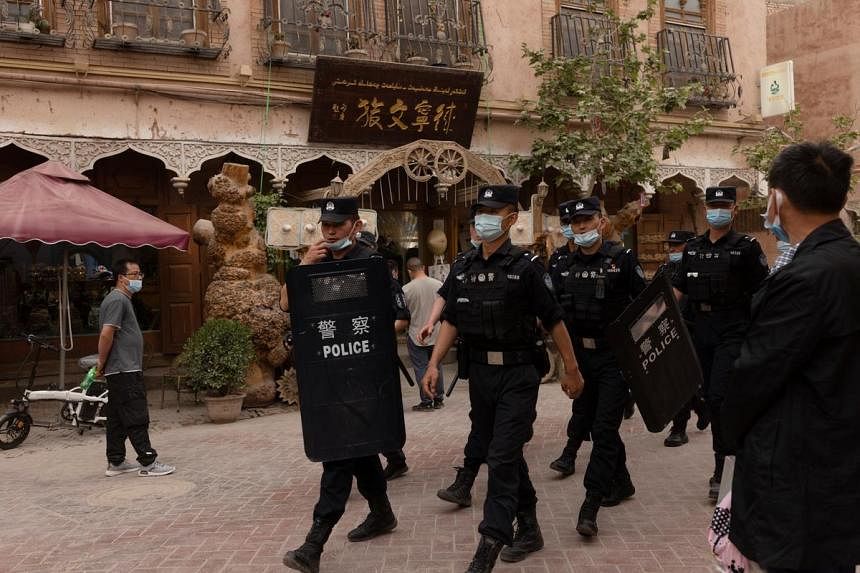China dismisses EU comments on human rights crackdown

Police officers patrol the streets in Kashgar, Xinjiang, where the EU says there is a “very serious” human rights situation. PHOTO: REUTERS
JUN 18, 2024,
BEIJING – China on June 18 dismissed European Union calls for it to stop alleged human rights violations, saying it opposed “double standards” and interference in its internal affairs.
The EU said on June 17 after an EU delegation visited Tibet and met with Chinese officials last week that it was concerned about what it called the “very serious” human rights situation in China, in particular in Xinjiang, Tibet and Hong Kong.
This included a crackdown on human rights defenders, lawyers and journalists in China.
The EU urged China to investigate any rights violations and expressed concern about cases of unlawful detention, enforced disappearance, torture and ill-treatment, the EU said in a statement.
In response, Chinese officials said the EU should “stop interfering in China’s internal affairs under the pretext of human rights issues”.
Foreign Ministry spokesperson Lin Jian told reporters at a briefing that China was willing to cooperate with the EU on the issue on a basis of equality and mutual respect.
“At the same time, China firmly opposes politicising the human rights issue and double standards, and opposes imposing one’s own model on others. We are opposed to… engaging in microphone diplomacy in the multilateral arena,” Mr Lin said.
He said both sides believed the dialogue was “frank and in-depth”, and said China was willing to explore further multilateral human rights cooperation in areas, including rights of women, children and the disabled.
The EU also raised the case of the detained Swedish citizen Gui Minhai, as well as the imprisoned Uighur intellectuals Ilham Tohti, Gulshan Abbas and Rahile Dawut, the EU statement said.
Chinese #MeToo activist and independent journalist Huang Xueqin was sentenced to five years in prison for subversion on June 14, which supporters called arbitrary and politically motivated.
BEIJING – China on June 18 dismissed European Union calls for it to stop alleged human rights violations, saying it opposed “double standards” and interference in its internal affairs.
The EU said on June 17 after an EU delegation visited Tibet and met with Chinese officials last week that it was concerned about what it called the “very serious” human rights situation in China, in particular in Xinjiang, Tibet and Hong Kong.
This included a crackdown on human rights defenders, lawyers and journalists in China.
The EU urged China to investigate any rights violations and expressed concern about cases of unlawful detention, enforced disappearance, torture and ill-treatment, the EU said in a statement.
In response, Chinese officials said the EU should “stop interfering in China’s internal affairs under the pretext of human rights issues”.
Foreign Ministry spokesperson Lin Jian told reporters at a briefing that China was willing to cooperate with the EU on the issue on a basis of equality and mutual respect.
“At the same time, China firmly opposes politicising the human rights issue and double standards, and opposes imposing one’s own model on others. We are opposed to… engaging in microphone diplomacy in the multilateral arena,” Mr Lin said.
He said both sides believed the dialogue was “frank and in-depth”, and said China was willing to explore further multilateral human rights cooperation in areas, including rights of women, children and the disabled.
The EU also raised the case of the detained Swedish citizen Gui Minhai, as well as the imprisoned Uighur intellectuals Ilham Tohti, Gulshan Abbas and Rahile Dawut, the EU statement said.
Chinese #MeToo activist and independent journalist Huang Xueqin was sentenced to five years in prison for subversion on June 14, which supporters called arbitrary and politically motivated.
REUTERS
No comments:
Post a Comment